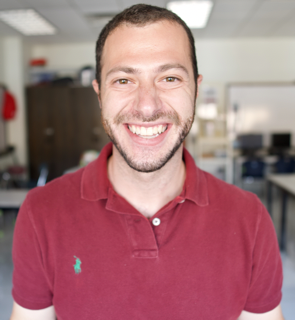About Me

I'm David Steckler, a 7th-grade computer science educator with a background in math. My teaching journey took an exciting turn when I accepted a position that combined math with robotics and automation. Despite not having a computer science degree, I embraced this challenge, turning my classroom into a space where programming meets philosophy.
My Teaching Philosophy
Inspired by my favorite high school class, "Dilemmas," I introduce my students to 44 core philosophies using ethical puzzles, ancient Greek riddles, stoic philosophies, and Zen proverbs. One key philosophy: there is no SPEED LIMIT to learning.
I believe that we don't know anything 100%, and the only belief I hold 100% is that I can't be 100% sure of anything. This perspective drives my curiosity and openness to new ideas. In my class, we explore themes of humanism, questioning identity, and how to prove our existence. These philosophical discussions help students think critically and hold their beliefs less strongly.
Why I Became a Teacher
I've always felt time is more enjoyable when I'm helping others learn. As an average student myself, I honed the skill of explaining complex topics in engaging and accessible ways. A pivotal moment was realizing how much I disliked the traditional school system, which prioritized grades over genuine curiosity and participation.
At 16, I worked a summer job teaching tennis at a Nike Tennis Camp where I was once a camper. This experience planted the seed of my teaching career, showing me the joy of helping others learn and improve.
My Approach to Learning and Teaching
I'm furiously curious and love learning. I developed the belief that I'll never be the smartest person in any room, which has driven me to ask interesting questions and engage in deep, nuanced conversations. I enjoy taking perspectives from all sides, seeing the good in various viewpoints, even if I disagree.
In my classroom, I encourage collaboration and mutual support. For example, I sometimes allow students to help each other on quizzes, teaching them that people help those they like. It's a practical lesson in the value of being helpful and building positive relationships.
Games and Strategy
I'm an avid gamer, particularly enjoying strategy games. Hearthstone is a favorite, where I love developing my own unique strategies rather than following popular meta decks. I also enjoy Slay the Spire for its engaging cycle of losing, learning, and improving.
Recently, I've been exploring game development, creating my own remake of a Python Legend of Zelda game based on a YouTube tutorial. This hands-on approach to learning and creating is something I bring into my classroom as well.
Hobbies and Interests
- Fitness: I'm a member of Lifetime Fitness, where I enjoy playing tennis and lifting weights.
- Travel and Seasonal Activities: I love embracing each season with unique experiences, like the Tim Burton Nightmare Before Christmas walk at the NY Botanical Garden or the Harry Potter Forbidden Forest Experience.
- Reading: I'm an avid Audible user, currently immersed in Brandon Sanderson's Cosmere universe. I'm working through the Mistborn series and have completed several books in the Stormlight Archive.
- Educational Reading: At the gym, I prefer educational books like "The Psychology of Money," "Same as Ever" by Morgan Housel, and works by Derek Sivers and Alex Hormozi.
- Dog Training: I love training my 1-year-3-month-old Aussiedoodle. She's a joy and constantly learning new tricks.
Current Projects and Goals
I'm currently working on integrating AI tools like ChatGPT into my classroom curriculum. It's an exciting challenge to develop lessons that leverage these powerful tools effectively.
On the personal front, I'm exploring investing, learning about stocks and cryptocurrency. I'm also considering expanding my side business in math tutoring.
My Approach to Programming Education
I strive to make programming fun and engaging by using a hands-on, iterative approach. My teaching style follows a "try-fail-grow-repeat" logic, similar to what makes video games so engaging. This approach encourages students to experiment, learn from mistakes, and continually improve their skills.
More About Me
- Embracer of challenges: I thrive on taking the difficult path if it promises greater satisfaction and growth.
- Philosopher in the classroom: I incorporate philosophical dilemmas into my teaching to encourage critical thinking and ethical reasoning.
- Game strategist: I apply the problem-solving skills I've honed in complex game worlds to real-life challenges and teaching methods.
- Lifelong learner: My curiosity drives me to constantly seek new perspectives and lessons from everyone and everything around me.
- Lover of deep conversations: I enjoy nuanced discussions on various topics, always striving to understand different viewpoints.
- Believer in learning from everyone: I'm constantly seeking different perspectives and new lessons from all walks of life.